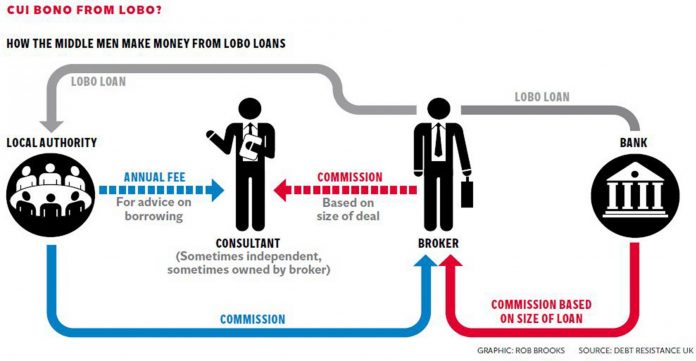Following the recent cancellation and refinancing of RBS LOBO loans by Kent County Council and bankrupt Northamptonshire County Council, an analysis of local government bank debt repayments by Research for Action finds that the top 10 LOBO loan borrowers are missing out on combined savings of approximately £4 billion in interest payments over the next 40 years by failing to replace expensive and risky bank loans with government loans. Between the 240 councils that have taken out bank LOBO loans, savings could reach £16 billion over the lifetime of the loans.
Commenting for Research for Action, Researcher Joel Benjamin said:
“For nearly a decade, the Conservative Government has trumpeted economic competence; while enforcing barbaric cuts on local government services, designed to tear up the post-war social contract between Town Halls and residents and radically redraw the role of councils as the punitive enforcement arm of austerity.
HM Treasury has been aware of the billions of pounds of savings available on mis-sold bank LOBO loans since at least March 2016, when they were asked to investigate toxic LOBO loans in an open letter [1]signed by MPs, academics and councillors, yet two years on, Treasury continues to ignore the problem, as billions of pounds of unnecessary further cuts decimate local services.”
Research for Action analysis applied the average interest rates and years to maturity from each council’s loan portfolio. Using 2.21% as the PWLB rate, researchers calculated potential savings by multiplying the annual difference between LOBO loan & PWLB loan interest payments, multiplying savings by the years to loan maturity.
These substantial savings could relieve pressure on strained austerity budgets, free up cash for local services and prevent further cuts.
It is important to note that the PWLB rates vary according to council, region and political control, and are subject to daily change, so the calculations should be taken as indicative only. Our figures do not include possible breakage fees, as we believe there should be no extra cost for councils to exit illegitimate LOBO loans, which were systematically mis-sold. For Kent County Council, 23% of the face value of the refinanced LOBO loans was paid to RBS as breakage fees. For the table below, see full workings and methodology here. [2]
Shadow Chancellor John McDonnell told the Guardian in relation to findings that councils were over-paying by as much as £16 billion: “The government has a role to play now in ensuring there is a full, independent and open investigation into the use of these financial instruments and action taken to restore any historic loss to the public purse.”
Research for Action supports this call. In October, the co-operative published a report on Newham Council LOBO loans, deeming the loans illegitimate and suggesting repayments should be suspended until the legality and legitimacy of the loans is examined. Research for Action also demands that all interest paid up until now is returned to councils and steps are taken to prevent the accumulation of illegitimate debt in the future.
[1] The open letter was hosted by Debt Resistance UK and submitted to HM Treasury and Andrew Tyrie of the Treasury Select Committee in March 2016 attracting 94 signatures http://lada.debtresistance.uk/letter-to-andrew-tyrie-mp-treasury-select-committee/
[2] Our methodology and workings for calculating the £4bn savings for the top 10 LOBO loan councils and £16bn of savings nationwide are set out in a Google spreadsheethere: https://docs.google.com/spreadsheets/d/1aNr8mho3X3UbZ-sjhLRlzHUmrjsyvJqCLNMG-PuM9g0/edit#gid=0







